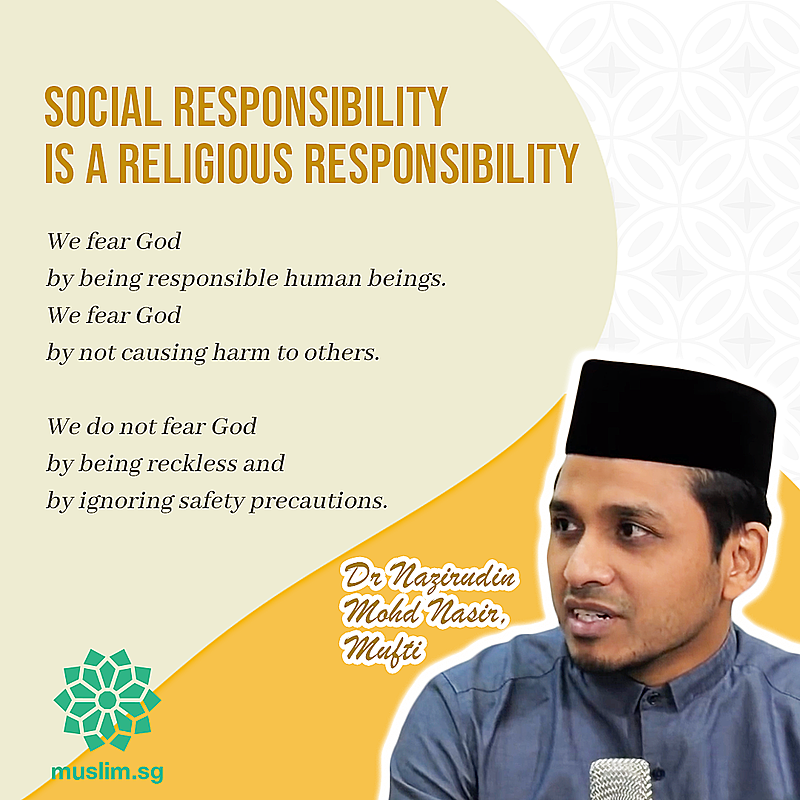4 Reasons To Avoid Shallow Thinking In The Covid-19 Contagion
4 Reasons To Avoid Shallow Thinking In The Covid-19 Contagion

COVID-19 is a contagion which is wreaking havoc around the world. Its effects are also felt by the Muslim community. Who would expect the holy city of Makkah and the Ka’aba to be deserted? But that is what is happening now. Mosques in many countries have been closed in order to curb the spread of the disease. Read How Muslims Around The World Are Adjusting Religious Life In Facing Covid-19.
This brings Muslims to the depths of despair. However, it is sadder still that in the midst of this pandemic, a segment of the community is spreading shallow thinking when responding to efforts to curb the spread of the disease.
We hear loud voices protesting the closure of mosques and the suspension of Friday prayers. They claim that the closing of mosques, suspension of Friday prayers and our responses to this epidemic were too extreme and not "Islamic". This despite the fact that the decisions were made after intense and careful deliberations by the fatwa institution, taking into consideration the views of renowned local and foreign religious scholars.
There also emerged a view that ‘We only need to fear God, trust and surrender ourselves to Him’. In upholding their views, some hurled profanities at our religious scholars and ignored the ethical behaviour and good values espoused in Islam.
In reality, who is being extreme? All of this unwarranted behaviour only shows the shallowness of thought, arrogance in character and deficiency in understanding among its perpetrators.
It is inconceivable that Islam would allow its followers to be in a state of confusion. It is impossible for God to reveal Islam as a religion that is static, rigid, and incapable of responding wisely to the problems of life. It is true that we need to rely on God, but blind reliance without effort is an insult to the essence of Islam.
Putting blind faith in God while exposing oneself to danger is pure folly and uncalled for.
The guidance of religious scholars and intellectuals on this matter is as clear as the sun in the day.

Those who are confused and unsure should refer to the learned for clarification instead of indulging in speculation and conjecture.
1. Many considerations
In the case of the closure of mosques or the suspension of the Friday prayers, the decision was made only after deep consideration and careful thinking, in line with the traditional scholastic traditions of Islam.

The stand taken is based on two considerations in the discipline of Islamic jurisprudence.
First: a deep understanding of “al-maqasid al-syariah” (the higher objectives of Islamic law); and second: “al-fiqh al-aulawiyyat” (the understanding of priorities).
The “al-maqasid al-syariah” requires an understanding that a solution given must be based of the supreme purpose of the divine law, while “al-fiqh al-aulawiyyat” is the hierarchy of principles that puts priorities in place, guided by divine revelation and good reasoning.
Every law and practice in Islam has different values.
What is obvious is that there is a difference between what is important and less important. Similarly, there are different ordering in values and law. The obligatory is to be prioritised over the recommended. Public interest must be paramount to individual interest. What is important is primary to the trivial. And prevention of harm must come first.
2. The Purpose Of Shari’a
One of the main objectives of the Islamic legal system is the preservation of life. This includes safeguarding the well-being of human life in general.
Based on this deep understanding of the higher objectives of Islamic law, as well as choosing what is the priority, the decision was made to close mosques temporarily. It is undeniable that the purpose is to control the pandemic that is threatening life and general welfare.

The obligation to care for the health and life of the people by controlling the spread of COVID-19 takes priority over congregational prayer at the mosque, which is only a recommended practice. Friday prayer itself is an individual obligation.
Thus, Islam allows a way out by providing a concession (rukhsah) without removing a key pillar in Islam, since prayers can still be performed. What is suspended in this state of emergency is congregational prayer and Friday prayer. The five daily prayers can still be performed while the Friday prayer is replaced with the mid-noon prayer.
Read 3 Reasons Why You Shouldn't Be Anxious About Missing Friday Prayers In This Period.
Adjustments must be made if the mosque were to reopen when the pandemic has not truly subsided. This may be in the form of congregational prayer that meets the requirement of safe distancing or implementing stringent health checks in order to prevent an outbreak of the disease.
This matter should no longer be disputed because the higher purpose of Islamic law and prioritisation were taken into account in its implementation.
3. Rukhsah (Concession)
There are many sayings of Prophet Muhammad (hadith) that call for easing of practices when a situation demands so.
The Prophet once said:
“Verily, God is pleased when concessions are granted, like how He is pleased when his commandments are obeyed.”
(Narrated by Imam al-Bukhari and Imam Muslim)
There is as much flexibility allowed in the circumstances permitted by Islamic law as for that which is obligatory.
This is the concession (rukhsah) that God provides in order to preserve life, which is one of the higher objectives of Islamic law. Whoever rejects it has transgressed and displayed an extreme form of religious practice.
In the hadith narrated by Ibn Mas’ud, Prophet Muhammad said: “Woe to the people who are extreme (in religion)!” He repeated this phrase three times. (narrated by Imam Muslim)
According to Imam al-Tayyibi (d. 1343 CE), an exegete and a scholar of hadith and the Arabic Language, the categorisation of extremism in religion includes not allowing concession (rukhsah) when a situation demands so.
4. Islam is Dynamic
Someone of healthy mind and reason would easily understand why the decision to close mosques and to suspend Friday prayers is permitted.
If the Messenger of God gave flexibility by allowing a person to not perform Friday prayer when a path is flooded due to rain, what more when a pandemic threatens life and health!
Simply put, Islamic law is dynamic; what is a duty and obligation will cease to be so when a matter of public interest arises and makes its demands.
For example, during the battle to liberate Makkah that occurred in the scorching heat during the month of Ramadan, Prophet Muhammad broke his fast because he took pity on of his Companions who were weak and thirsty.

There were some who witnessed the Prophet’s act and refused to break their fast. When the Companions asked the Prophet about them, he replied, “They are the evil-doers! They are the evil-doers!” (Hadith narrated by Imam al-Bukhari)
Prophet Muhammad considered the ones who rejected concession (rukhsah) then as the evil-doers.
In many instances, shallow thinking destroys the pristine nature of Islam and narrows the vastness of this religion of God. It impedes the mature evaluation of an issue and traps us in a mind that is simplistic, literalist and static.

